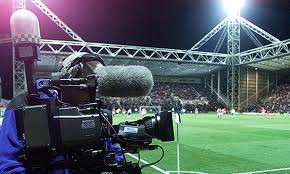By Andrew Warshaw
February 14 – The bubble hasn’t exactly burst for domestic rights to show Premier League games but maybe a ceiling has been hit in terms of the value of matches.
For the first time in a number of years the Premier League’s income from domestic rights is set to fall after Sky, together with BT Sport, agreed to pay less under the latest three-year deal just struck: £4.46 billion to show 160 live games a season starting in 2019-20. In the current cycle they paid £5.14 billion for 168 live games.
Sky Sports have agreed to fork out £3.579 billion for four of the seven packages, totalling 128 games per season, while BT Sport have paid £295 million for one package of 32 live games. Two of the seven 20-match packages are still to be allocated and this looks to be where the door may have been opened for US streaming service Amazon to get a foothold in the UK domestic market.
Both the outstanding packages allow for simultaneous live broadcast of matches – there are two rounds of fixtures in each package (20 games in each, 40 games in total). This would allow the Premier League to test the water for livestreaming of its matches, something the 72-club Football League is already doing. The packages cover one round of Bank Holiday fixture packaged with one mid-week round, and two further mid-week rounds packaged together.
To achieve parity with the last domestic feel achieved, that would mean selling the games at an average of £16.9 million each. BT Sport are said to be still in the hunt but Amazon’s deep pockets could be the game-changer here, and over time perhaps in more way than one if it proved successful and ushered in a new approach to broadcast rights sales to match increasingly fragmenting audiences, even for football.
Significantly, Sky are paying 16% less per game under the 2019-2022 deal, which equates to around £9.3 million per game – less than the £11.05 million-per-game value of the current cycle.
The past two domestic deals in the world’s richest league both produced 70% jumps in the value of rights, with the knock-on effect of spiralling wages and increased transfer fees. But reports suggest both Sky and BT Sport have become increasingly financially stretched to justify pushing the price higher.
While Sky are big financial winners in the new domestic deal, BT Sport, the relatively new kids on the block, had to agree to pay £9.2 million, up from £7.6 million, for one package of 32 games. That means the broadcaster, while paying more, has actually lost 10 games and will only screen games now at Saturday lunchtime, a less attractive scenario than the more popular 5.30pm slot.
While the Premier League increased the number of games available for live broadcasting in Britain to 200, only overseas channels are able to air all 380 fixtures per season live in order to protect stadium attendances. Although the income from domestic rights has slipped, overall revenue could ultimately end up higher as a result of international broadcast rights. Interestingly, the 2019-2022 Chinese rights have already been sold to online video streaming service PPTV for $700 million in the Premier League’s biggest-ever global deal. In 2015, the American rights were sold through 2022 to NBC in a six-year deal worth $1 billion.
Premier League chairman Richard Scudamore was typically upbeat about the new domestic deal.
“To have achieved this investment with two packages of live rights remaining to sell is an outcome that is testament to the excellent football competition delivered by the clubs,” Scudamore said. “It provides them with certainty and will underpin their continued efforts to put on the most compelling football, invest sustainably in all areas, and use their popularity and reach to have a positive impact on the sport and beyond.”
Still predominantly a phone and broadband provider, it should be noted that BT Sport currently has exclusive rights in the UK to show Champions league games live: a significant coup, not least this season with so many English teams still in contention.
The company said it expected to make a profit despite laying out more for Premier League games than last time.
“BT Sport has remained financially disciplined during this process and remains in a strong position to make a return on this investment through subscription, wholesale, commercial and advertising revenues, especially following the acquisition of [mobile telephone network] EE, which more than doubled BT’s customer base,” a statement said.
Contact the writer of this story at moc.l1751425135labto1751425135ofdlr1751425135owedi1751425135sni@w1751425135ahsra1751425135w.wer1751425135dna1751425135

